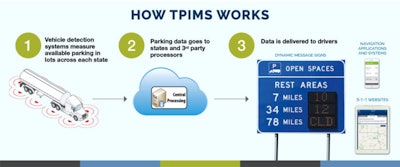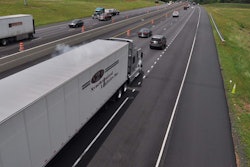 American Truck Parking’s site shows truck parking availability and truck parking locations. The FHWA-funded project also offers dynamic parking availability in eight states.
American Truck Parking’s site shows truck parking availability and truck parking locations. The FHWA-funded project also offers dynamic parking availability in eight states.According to figures published by the Federal Highway Administration and the Federal Motor Carrier Safety Administration, the number of large truck registrations in the United States rose by 27.6 percent between 2008 and 2016. The estimated vehicle miles traveled for those trucks increased 26.6 percent.
There are more trucks on the road today than ever, but truck parking capacity has been unable to keep pace, exacerbating an already bad situation.
The issue of safe truck parking was underscored on March 4, 2009, when 35-year-old trucker Jason Rivenburg arrived at a receiver facility ahead of schedule. Unable to enter the receiver’s facility early, he pulled over at an abandoned gas station just 12 miles from his destination near Columbia, S.C. Two days later, his body was found in the cab of his truck with two gunshot wounds to the head.
The incident sparked a national conversation around the scarcity of truck parking in the United States. In 2012, Jason’s Law was enacted with the signing of the MAP-21 transportation authorization bill. That language created new avenues for federal funding of public and private truck-parking initiatives. It also required a study of the availability of parking facilities within each state.
Truck parking has been near the top of the list of driver concerns in the American Transportation Research Institute’s Critical Issues Facing the Trucking Industry annual report that ranks issues affecting both commercial drivers and motor carriers. But ATRI’s 2018 report published last October indicates the truck parking problem isn’t just an issue for drivers anymore. For the first time in recent memory, truck parking was listed as a top concern for motor carrier respondents (No. 9 in 2018).
“I have long made the point that if the driver shortage is the No. 1 concern for carriers and driver retention is the No. 2 concern for carriers, then they best understand, appreciate and be working towards looking to identify solutions to the driver side of the [survey] where truck parking is the No. 2 concern,” said Rebecca Brewster, ATRI president and COO.
Making matters worse
Many states have shuttered rest areas, either seasonally or permanently, as a cost-cutting measure. Last year, Connecticut shut down one of its seven state-operated rest areas and closed facilities at the remaining locations between the hours of 3:30 p.m. and 8:30 a.m.
The Iowa Department of Transportation is currently considering a proposed measure that would eliminate 11 full-service rest areas and 16 parking-only rest areas, a move that would eliminate 35 percent of truck parking across the state’s rest area network.
Without available parking, many drivers are forced to find parking wherever they can. The first Jason’s Law Truck Parking Survey conducted in 2015 by FHWA revealed 53 percent of drivers regularly use a commercial truck stop for rest and 20 percent regularly use a rest area. Other options used regularly include shipper/receiver location (20 percent), on/off ramp (8 percent), abandoned lot/isolated area (10 percent) and behind a shopping center (11 percent).
The electronic logging device mandate that took effect in April 2018 hasn’t eliminated truck parking capacity, but it has put a premium on drivers finding the right spot at the right time or risk exceeding hours-of-service in search of a safe, authorized parking spot.
Illegally parked trucks on the road shoulder and on-ramps also confound state law enforcement officers who may be reluctant to wake a sleeping driver who may be out of hours and have them move to an authorized parking spot due to safety concerns.
“A driver sleeping in a truck parked on the side of a highway may be more of a danger to other motorists if he or she is awakened and ordered to vacate the premises,” said FHWA in its Jason’s Law survey analysis. “Police officers presented with this scenario often find themselves in the uncomfortable position of weighing the competing hazards of an illegally parked truck and a fatigued driver.”
ATRI’s 14-day truck parking travel diary study of 148 participating drivers conducted in 2016 found that almost 84 percent of participating drivers admitted to parking in unauthorized/illegal areas at least once per week, with 58 percent saying they did so at least three times per week or more.
Nearly two out of three respondents to an Overdrive survey on the effects of the ELD mandate on parking availability reported lots are full or close to full earlier in the evening and/or later in the morning.
Fleets are now taking notice, particularly as the parking conundrum is eating into productivity and customer expectations. “There has been enough of a collective cry on the part of drivers that this is such a significant issue for them that fleets are recognizing and acknowledging that it is a real problem for the trucking industry,” said Brewster.
“Our fleet customers are seeing their drivers are having to pull off of the highways early in their driving window in order to make sure they can find parking,” said John Archard, vice president of sales for Love’s Travel Stops & Country Stores. “Certainly, that fleet would prefer to have the truck driving down the interstate moving freight rather than just finding parking.”
The Jason’s Law survey revealed that 39 percent of respondents spend an hour or more to find truck parking.
The diary study showed drivers were leaving valuable minutes of available drive time on the table in favor of a parking spot. Eighty-six percent of participants forfeited at least 30 minutes of available drive time on average, with 46 percent saying they gave up more than an hour of drive time in order to secure parking. The report, A Comparative Analysis of Truck Parking Travel Diary Data, can be downloaded here.
The diary study also showed 43.5 percent of drivers spent more than 10 minutes per day on average looking for available parking, while searching during peak times of 4 p.m. to 7 p.m. and 7 p.m. to midnight often resulted in search times of 15 minutes or more.
Owner-operator Tilden Curl, who specializes in step deck freight along the congested I-5 corridor between his Washington State home and Northern California, has seen the peak extension phenomenon firsthand. Before the mandate, he says, “things were really starting to get pretty full at rest areas and other places” by 8 or 9 p.m. Now “you have to plan your schedule to be parked by six in the evening.”
Leveraging technology
In response to the growing truck parking problem, major travel centers and solutions providers are leveraging technology to help ease the burden, and drivers are increasingly turning to smartphones and other in-cab communications devices to help locate available parking locations.
Intelligent Imaging Systems offers hardware and software solutions as part of its IIS Smart Parking platform that uses both cameras and in-ground sensors to detect open parking locations and keep track of available parking capacity in near real-time.
Travel Centers of America provides available parking counts for TA and Petro locations through its free TruckSmart driver app. The counts show “total parking spaces” by location and “available parking spaces.”
TA-Petro launched its Reserve-It parking reservation system that allows drivers to use the app to reserve and pay for parking spots up to 30 days in advance at most locations. Drivers can check in for a reserved parking space after 4 p.m., with a check-out time of 3 p.m. on the day of departure.
The company also offers a no-cost option with its Preferred Parking program at 11 TA and Petro sites across the country. Customers receive 24 hours of free truck parking for every 60 gallons of fuel purchased, up to a maximum of 72 hours of parking at a single location. Drivers can earn another 24 hours of free parking when they spend 20 dollars or more in the store, restaurant or service area.
Pilot Flying J also offers paid parking reservations and allows drivers to pay with my Rewards points and search real-time available spaces.
“To help professional drivers plan ahead, we offer Prime Parking to our guests which allows drivers to reserve a spot at more than 300 Pilot and Flying J travel centers,” said Stephanie Myers, supervisor of external communication at Pilot Flying J.
The ATRI diary study revealed more than half of the participants were willing to pay for a parking reservation at a truck stop, but Love’s has decided not to pursue the pay-to-park model offered by its competitors.
“Anything we do for parking has to add value and not be in our estimation something that is just a tax to charge for parking because we know it is in demand,” said Archard. “We haven’t found a lot of fleet customers have found a way to use reserved parking in a way that adds value. What we are pursuing as an alternative to paid and reserved parking is a system that accurately publishes available parking. We look at this as a ‘must-have’ on an ongoing basis.”
 The Mid-America Association of State Transportation Officials debuted its Trucks Park Here to provide drivers and carriers with real-time parking availability along major freight corridors across eight states.
The Mid-America Association of State Transportation Officials debuted its Trucks Park Here to provide drivers and carriers with real-time parking availability along major freight corridors across eight states.In the meantime, Love’s is putting a premium on parking capacity as it continues its aggressive expansion. Existing stores average between 80 to 100 parking spots per location, but new stores average 100 or more parking spots. Love’s currently is adding between 3,000 and 4,000 parking spaces per year with new locations as well as adding parking capacity at existing locations.
Third-party providers also are demonstrating uses for truck parking technology. American Truck Parking, a FHWA-funded research-deployment effort led by UC Berkley Transportation Sustainability Research Center and the California Department of Transportation, displays truck parking locations at private truck stops, logistics terminals and public rest areas. The company also is demonstrating dynamic parking availability at select locations in California, Virginia, Wisconsin, Minnesota, Ohio, Indiana, Kentucky and Florida.
The Mid-America Association of State Transportation Officials received a $25 million grant from FHWA to establish a unified truck parking management information system in Indiana, Kentucky, Minnesota, Michigan, Ohio, Wisconsin and Iowa and Kansas. Dubbed “Trucks Park Here,” the effort went live in January and uses sensors in individual parking spots and/or counting vehicles as they enter and leave a facility to track truck parking availability. The number of available spots is displayed on roadside message boards and also is available via smartphone apps and web-based data feeds.
“Safe, convenient parking is crucial for commercial drivers who spend long stretches of time on the road,” said Andy Barber, state highway engineer for the Kentucky Transportation Cabinet. “TPIMS will help truckers locate open spaces in safe, appropriate lots found on popular travel corridors to discourage drivers from parking on highway shoulders, off ramps or at abandoned facilities that can compromise safety and deteriorate roads.”














